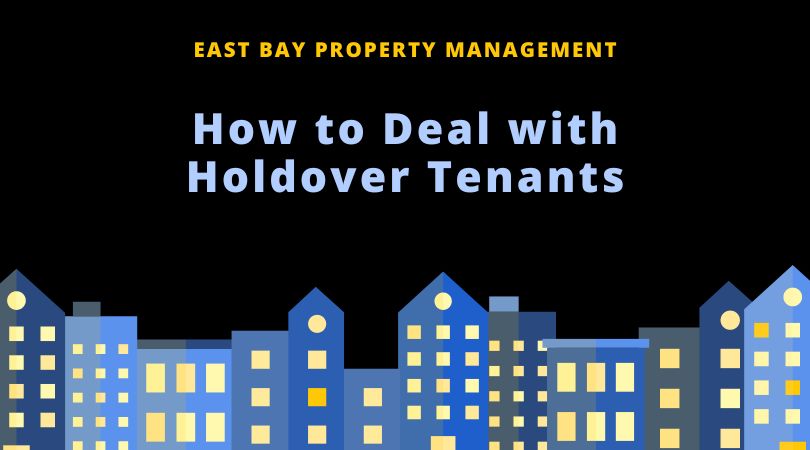Usually, when it comes to tenants, a landlord is worried about a tenant breaking their lease early or being unable to find suitable tenants to stay in their rental property for the long run.
Sometimes, however, a tenant overstays the period of their lease. Once this happens and the lease is not renewed, the tenant is referred to as a holdover tenant.
In this post, we are going over everything you need to know about a holdover tenant.
Is a Holdover Tenancy Illegal?
A holdover tenant can often be referred to as a “tenant at sufferance” because their residence in the unit is completely under the landlord’s control. A holdover tenancy is not illegal as long as the landlord makes no effort to remove the holdover tenant. If the tenant continues to pay rent, it could be considered a month-to-month tenancy.
A holdover tenancy, however, can be damaging to the landlord and the success of the rental property.
Potential Issues with a Holdover Tenancy
Here are a few examples of potential issues you can encounter when allowing a holdover tenant to stay in your rental property.
Trouble When Pursuing Eviction
If a tenant stays in the property without renewing their lease and the landlord allows it, they become a holdover tenant, but if a tenant refuses to leave the property when a landlord wants them to, it may mean you have to pursue eviction.
The laws when it comes to holdover tenants and eviction are a bit different than those of regular evictions. Once you allow someone to become a holdover tenant, you must make sure that you study the laws and regulations for your state to comply when filing for eviction.

Unexpected Vacancies
Due to the nature of a holdover tenancy, you won’t need to be notified in advance when the tenant plans to leave the property. This can cause an unexpected vacancy of your rental unit.
As any landlord knows, the longer a property is vacant, the more money is lost due to continued upkeep without incoming revenue. Finding new tenants, screening them, having them sign the lease, and having them move in is not a short process. You’ll need time to do it properly.
If you don’t have a tenant lined up, your unit may stay vacant longer than you’d want it to, and it could hurt your bottom line.
Interruptions to Scheduled Maintenance
Since the tenant had not planned on renewing the lease, you may have continued with scheduled maintenance plans for the unit. Everything from renovations to deep cleaning services may be things you planned in advance while knowing the unit would be empty.
Having the unit occupied when you expected it to be vacant not only stalls any maintenance plans you had, but also may even cause a loss of revenue if you had to put down a deposit or advanced payment to procure these services. There’s also a possibility of further damage to the property as the tenant continues to live there.

Unable to Raise the Rent
To regain lost revenue, you may want to increase the rent your holdover tenant is being charged. However, the regulations regarding holdover tenants may not allow that.
Often, regulations state that rent must stay the same for as long as the current tenant is staying in the unit. As a new lease hasn’t been signed, increasing your holdover tenant’s rent is not always an option.
Options When it Comes to a Holdover Tenant
When it comes to a holdover tenant, you have two options when deciding what to do:
- Let them stay and become a holdover tenant. If you continue to collect a monthly rent from them without a new lease being signed, you are agreeing to the holdover tenancy. By doing this, you lose any right to evict them due to the holdover tenancy.
- Pursue the eviction process. If you do not want the tenant to begin a holdover tenancy, you can always treat them as a trespasser and pursue the eviction process. Before this step, if you enjoy having the tenant occupy your unit, you can always ask if they’d like to renew their lease. Holdover tenancies, under the law, are often treated like month-to-month tenancies. You can evict a holdover tenant for a variety of reasons but must always give them a 30-day notice of eviction.
Most of the time, landlords are bound to the option they choose to pursue. To make sure you comply with all the state laws, consult your legal counsel.

Considering a Periodic Tenancy
When talking about holdover tenancies, periodic tenancies are often mentioned. A periodic tenancy is a tenancy with no fixed term or end date to it. Basically, the point of periodic tenancies is that they must be ended, not renewed. If neither party gives reasonable notice to end the tenancy, it automatically renews at the end of the period indicated.
The ‘period’ in a periodic tenancy can be as long or short as both you and your tenant decide. Common periods are on a weekly, biweekly or monthly basis. So, say, if you have a weekly periodic tenancy, the tenancy will automatically renew itself at the end of each week unless you or your tenant give notice to end it.
Avoiding a Holdover Tenancy
If you’re not interested in a holdover tenancy at all, the best practice may be to try avoiding the situation in its entirety. This could save you the headache of any complicated future proceedings.
One way to avoid a holdover tenancy is to both remind a tenant of their responsibility to move out about 60 days before their tenancy expires and to add a mandatory move-out clause in your lease, stating that holdover tenancies are not acceptable when residing in your unit. Remind them again about their need to move out closer to the end of the lease term.
If your tenant decides to overstay their welcome anyway, make sure not to accept a single rent payment outside of the lease term. Once you accept rent, you automatically have agreed to a holdover tenancy, and must deal with it as such from then on. Unless a new lease is signed, never accept a new rent payment.

Bottom Line
Being a landlord can be a difficult and complicated task, especially when dealing with tricky notions like holdover tenancies, but it doesn’t have to be. Rely on the experts at East Bay Property Management!
We have years of experience that will make managing a rental property feel easy. Get in touch with us today and find out how we can help your investment succeed!






